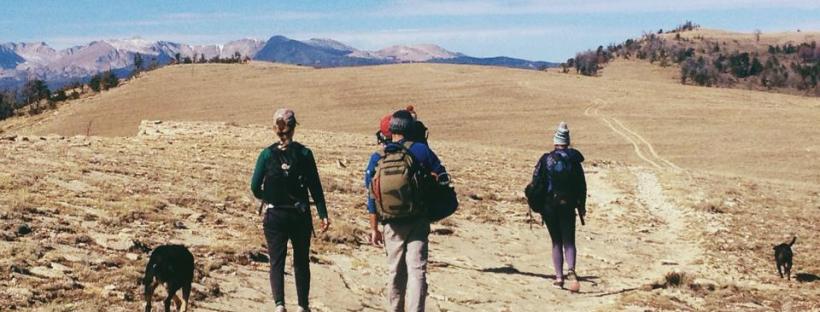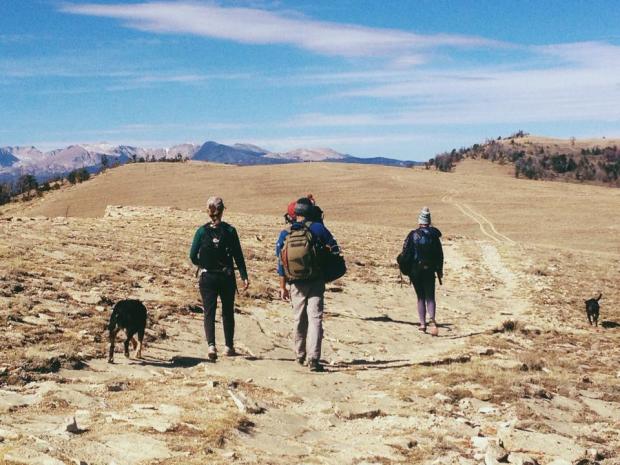A few weeks ago, the magazine High Country News published an article called “The Death of Backpacking,” and a similar article was published a few days later in Outside magazine. In it, the author explored reasons why people under 40 are rarely, if ever, seen backpacking these days (he very kindly did not just target “millenials”).
It’s not that us young folks don’t like going outdoors; on the contrary, we do lots of outdoor activities and the outdoor industry is doing well. But it’s the style and type of activity young people seek that have changed, according to the author.
I may be one of those “gentle curmudgeons who can’t understand why the damn kids aren’t interested in hauling 40 pounds into wilderness.”
Outdoor retailers have documented a rise in the sale of day packs and light trail runners over expedition packs and boots, and there is growing interest in activities like rock climbing and whitewater rafting. But, as the article’s author points out, these are often guided, day-long activities, after which you retreat to your car, air-conditioning, and a cold beverage.
At first, I was indignant when I read this article. I’m a young person who goes backpacking! But I have to admit that I live in a small mountain town that’s crawling with backpackers and climbers, so my perspective is skewed. When I considered more carefully, I realized that many of my friends in bigger cities rarely, if ever, go outdoors for overnight trips.
I suspect that I’m just one of the article’s “gentle curmudgeons who can’t understand why the damn kids aren’t interested in hauling 40 pounds into wilderness.”
To try not being a curmudgeon, I decided to explore why other young folks are avoiding multi-day backpacking trips these days.
I came up with five main reasons why; and, because I am a curmudgeon, I added a few thoughts to argue with them.
Reasons Not to Go Backpacking
1. It’s a time-suck
Most people work 40 hours or more per week, and they’re lucky if they can leave even one hour early during the summer. Backpacking involves leaving the city on a Friday afternoon (cue horrendous traffic) and returning late Sunday evening (cue exhausted Monday morning and more traffic), if you want to make the most out of your time.
That eats up whatever time you may have needed to run errands, call your family, get a beer with that one friend you haven’t seen in a month, go to a movie, or catch up on a TV show. So you’re stuck rushing to do those things on weekday evenings, or just never getting them done. Backpacking is time when you can’t be productive.
It all depends how you want to spend your time.

The likelihood of this type of friendship forming goes up exponentially the longer you spend outside. It’s science.
Filling up the weekends with those phone calls, errands, and productivity is important and sometimes necessary. But, at the same, time, people are really busy during the week. Is continuing that same mindset on the weekend really a rest, is it really helpful?
Americans live in a culture that values busy-ness and having something to show for what you’re doing. Backpacking, and many outdoor activities, doesn’t fit into that, and it helps remind us that it’s ok not to be productive.
When you backpack, even for a weekend trip, you get outside your weekday world and gain perspective on it. That perspective lets you choose what you want to do more deliberately and evaluate on how you’re spending your time, rather than being caught up in the bustle all the time.
2. It’s hard on your body
Backpacking makes your knees hurt. It makes your spine hurt. It makes your hipbones, shoulders, feet, calves, and Achilles hurt.
Backpacking is hard, true, but this difficulty can be eased with exercise, practice, and smart packing choices.
Part of the aches and pains comes from fitness and being accustomed to the activity. Most of us don’t carry a backpack on a daily basis, so we don’t develop the muscles for it. But, the more you do it, the stronger you get. You’ll build those muscles over time. And so, the curmudgeon in me says: let’s get fit and get over it.
As for those with bad joints, going with lighter packs and gear or trying to avoid trails with steep downhills and uphills can hugely lessen the strain on your body. Most lightweight packs weigh less than 30 pounds when fully loaded, meaning you can still get the backpacking in with less weight beating on your body.
3. There’s no adrenaline payoff.
Walking uphill is not that exciting, even if the view from the top is pretty. It’s boring, and nothing really ever happens unless you spot a moose (or bear … ).
We don’t always need adrenaline; sometimes, we need serenity.
True, a lot of times you don’t get the same rush from avoiding tree roots on a trail as when you run a churning rapid, or find your leg starting to shake ten feet above your last bolt on a climbing route. But we don’t always need adrenaline; sometimes, we need serenity.
We need the simple satisfaction of getting to the top of a hill after hours of work. Our lives move so quickly that crawling along a trail can offer us balance. Even if you prefer to go fast and lightweight, as you spend time outdoors you can still pause whenever you want for sheer pleasure.
I won’t lie that I’m a fan of the exciting sports; my heart races when I climb and I love it. But I don’t need that in every sport I do. Plus, if you have ever been caught in a lightning storm when you’re trying to descend from a high, exposed ridge, you’ll know that will get your heart racing just as much as any rapid!
4. It’s uncomfortable
Backpacking involves a lot of time spent being uncomfortable. The pack is heavy, your shirt gets crunchy with your dried sweat, there’s no easy way to poop or pee, your sleeping pad deflates and the ground is hard, and in the morning, when you prepare your breakfast and you can see your breath, it is cold. You can day-hike, see some beautiful scenery and wildlife and still sleep in your bed, so why fuss with this extra stuff that’s absolutely zero fun?
Being uncomfortable is a good thing.
There’s no denying that you have to accept a lot of discomforts when you go backpacking. And I can think of so many reasons why this is a good thing. Challenges help us grow, they help us think. When you lose your tent stakes and need to problem-solve, that teaches you resourcefulness (and to keep track of your stuff).
In curmudgeon terms: It builds character!
The extra work of meeting our basic physical needs, fetching water, preparing meals on a little stove, living in an exposed and precarious shelter, brings us closer to those needs. It reminds us house-dwellers of what our bodies thrive on and forces us to listen to them and respond. That can make us more in tune with those needs when we’re in the city.
When you’re backpacking, if your neck starts to hurt you adjust your pack. In the city, however, we let ourselves sit at desks for hours at a time and skip meals because we’re busy or felt like we didn’t exercise enough. It’s easy to let our needs slide, because that discomfort usually doesn’t spell out an immediate disaster.
Getting accustomed to listening to your needs while on the trail may mean that, rather than stay at the computer, you’ll get up, stretch, and walk around for a few minutes. You’ll end your day with a happier body and mind.
5. I can’t afford the gear and don’t know how to do anything
Bigger packs cost more than small packs, tent prices are outrageous, I don’t know what a bear hang is, and if I go into the wilderness then I’ll starve or only be able to eat Snickers bars (actually, that might be fine…).
These are important problems, but they aren’t insurmountable.
You don’t have to invest a lot of money in a lot of gear immediately. Odds are you know someone who once bought a backpack, someone who thought they might hike the Appalachian Trail and got a good pair of boots, and more. Ask around and see what your friends and family have.
Another resource for gear and expertise are outdoor stores. Most of them rent equipment for a modest price, and they might even show you how to use it if you ask nicely.
As for the skills, it’s true that you don’t want to go charging into the woods with no knowledge of weather concerns, animals, and risks involved, or without knowing how to take care of yourself. Do your research and ask for advice.
If you have a friend who backpacks, ask for help; research the area you’re visiting to find out about terrain and weather patterns; and ask for help from your gear outfitters. Many of them offer weekend classes on the basics of camping, navigation, and even nature photography. Drag a friend along to make it more fun, and so you have a buddy to go with when you hit the trail.
Finally, seek out local outdoor organizations and nonprofits; most areas have a dedicated outdoor nonprofit, and their events are likely less expensive than those at an outdoor store.
I also highly recommend taking some type of wilderness first aid course. You want to be able to care for your friends or yourself should the need arise. Plus, having those skills builds an incredible amount of self-reliance and self-confidence. Again, the extra skills required are another tick against backpacking, but first aid and self-care are skills that you can use in the city as well, so you get a pretty good bang for your buck, and you might save a life!
Even if this reasoning doesn’t convince a generation of youths to fly to the world of extended backpacking trips, I still highly doubt that backpacking will die. Enough people find joy in living outside for days on end, even if it’s a minority, for it to die. But it will probably change form and look different than what I consider the ideal form of the sport.
And that’s ok; it’s even fantastic. Because as long as folks still go to spend real time, extended time, outside, then we’ll be able to keep alive that unique and soul-feeding connection with the world outdoors.
Do you love spending days outdoors, or is life better when you can sleep in a bed every night? Share your opinion below!


Great article! Enjoyed it!
LikeLike
I’m glad you enjoyed it!
LikeLike
Wonderful post @mgherber33 I myself am not one for extensive exercise but I can really relate to what you’ve said in point number three. While I may regularly dread the thoughts of strenuous outdoor activity, my love of the outdoors itself will always have far more of an influence on me.
LikeLike
I’m glad you enjoyed it! Different folks enjoy the outdoors in different ways, and what matters is that you spend your time in the way that fits you best, whether that’s a long trail run or just finding a quiet place to sit for a while.
LikeLiked by 1 person